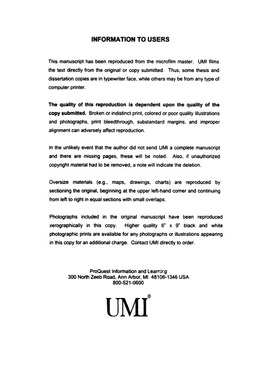| dc.contributor.advisor | Michaelsen, Larry, | en_US |
| dc.contributor.author | Mccord, Mary Helen. | en_US |
| dc.date.accessioned | 2013-08-16T12:18:17Z | |
| dc.date.available | 2013-08-16T12:18:17Z | |
| dc.date.issued | 2001 | en_US |
| dc.identifier.uri | https://hdl.handle.net/11244/330 | |
| dc.description.abstract | Type of task was categorized as 'independent' and 'interdependent' based on hours spent working alone vs. face-to-face. Results overwhelming supported the superiority of interdependent tasks as compared to independent tasks for group learning. Even when students reported on their least positive group experience, interdependent tasks were associated with perceptions of increased learning effectiveness. | en_US |
| dc.description.abstract | The purpose of this study was to empirically examine: (1) the mediating impact of the type of tasks used for group learning and (2) how the type of task affects students' attitudes towards learning in diverse groups. In addition, this study examined the relationships between members' attributes (personal traits and task competencies) and the type of task to perceived learning experience in groups or to perceived performance of other group members. Models of the relationship of member attributes and task type to (1) perceived learning effectiveness and (2) perceptions of other members' performance were proposed. | en_US |
| dc.description.abstract | Results also indicated that: (1) most personal traits (class standing, ethnicity, age and gender) impacted perceived learning effectiveness only when students' reported on their least positive group experience and, (2) students who were a racial minority within their group preferred to work alone no matter what type of group task. | en_US |
| dc.description.abstract | Data for the study were obtained from 822 undergraduate business students at 8 US and 2 Canadian universities. Subjects were randomly assigned to complete one of two surveys during the first class period of the final semester of their senior year. The surveys asked students to report on either their most positive or least positive group experience from a previous class. | en_US |
| dc.description.abstract | The relationships between members' personal traits or task competencies and perceptions of their performance showed no impact from the member's personal traits. No matter which type of task or type of group experience, a member's task competencies positively influenced perceptions of a their overall performance. A member's dependability impacted their perceived overall performance much more than other task related traits. A member's knowledge skills also strongly impacted perceptions of their performance. | en_US |
| dc.format.extent | xviii, 256 leaves : | en_US |
| dc.subject | Business Administration, Management. | en_US |
| dc.subject | Learning. | en_US |
| dc.subject | Learning, Psychology of. | en_US |
| dc.subject | Sociology, Demography. | en_US |
| dc.subject | Education, Business. | en_US |
| dc.subject | Education, Educational Psychology. | en_US |
| dc.title | The formation of learning group members' perceptions: An empirical study of the nature of the task. | en_US |
| dc.type | Thesis | en_US |
| dc.thesis.degree | Ph.D. | en_US |
| dc.thesis.degreeDiscipline | Michael F. Price College of Business | en_US |
| dc.note | Chair: Larry Michaelsen. | en_US |
| dc.note | Source: Dissertation Abstracts International, Volume: 62-04, Section: A, page: 1499. | en_US |
| ou.identifier | (UMI)AAI3013154 | en_US |
| ou.group | Michael F. Price College of Business | |
